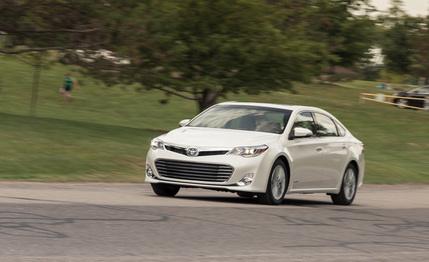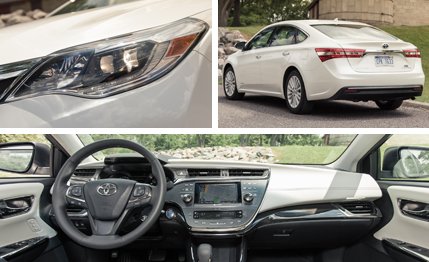 Instrumented Test
TESTED
Instrumented Test
TESTED
Just when it seemed Toyota had shook the Avalon’s sleepy, old-person-friendly image with a zesty redesign for 2013, along comes this hybrid variant to codger it right back up, right? But, lo, the Avalon hybrid doesn’t negate the cool points earned by the latest gas model. It is as stylish as that version, and it is easily the belle of the big-sedan ball next to its only gas-electric competitor, Buick’s LaCrosse eAssist mild hybrid, and the hybrid asks only that you sacrifice some acceleration and a little extra coin relative to the comparison-test-winning V-6 Avalon.
Two Cylinders Go Missing, a Battery Fills In
In place of the regular Avalon’s 268-hp, 3.5-liter V-6, the hybrid gets the 156-hp, 2.5-liter four-cylinder and 141-hp electric motor combination employed by the Camry hybrid. A CVT-like planetary gearbox transfers the system’s combined 200 horsepower to the front wheels, and a 1.6-kWh nickel-metal-hydride battery pack provides juice while eating only two cubic feet of trunk space. As you’d expect, the less-powerful hybrid’s 8.4-second 0-to-60 time is 2.3 seconds slower than the V-6 model’s, but it feels adequate in normal traffic.
In exchange for being slightly slower than the V-6, the Avalon hybrid gives much better fuel economy. The EPA estimates the hybrid will return 40 mpg in the city and 39 mpg on the highway—19 and 8 mpg higher than the gas model’s 21/31 ratings. We averaged 33 mpg, beating a V-6 Avalon Limited we recently tested by a substantial 12 mpg. Not bad, considering we saw 30 mpg from the lighter 2012 Camry hybrid and 32 from the 2013 Ford Fusion hybrid in other recent tests.
The fuel-economy story’s happy ending is partly provided by the hybrid’s EV-only mode. This locks the Avalon into electric-only operation up to about 20 mph for up to one mile, according to Toyota. With a fully charged battery (confirmed by the dashboard screen’s power-flow display), we managed 2.6 dizzy, fossil-fuel-less miles circling our office parking lot on electric power. There are three other manually selectable drive modes: Normal is the default, Sport summons sharper throttle tuning and heavier steering effort for friskier moments, and Eco dulls throttle inputs and meters the A/C compressor to enhance efficiency.

Staying in EV mode—especially from a stop—demands a gentle right foot and a heaping helping of patience. We found that the Avalon could maintain up to 45 mph on electric power alone, but the gas engine is required to reach that speed. Lift off the accelerator while at a steady sub-50-mph cruise on level ground or down a hill, and the electric motor takes over; gently step back onto the gas, and you can sail along on electrons alone. A low battery, a grade, or abrupt throttle changes will reawaken the engine.
Abandon the ecoconscious agenda, and the hybrid won’t bore you silly. Like the V-6 Avalon, the hybrid is far more engaging to drive than Avalons of yore, as well as every other hybrid Toyota offers, thanks to a less willowy structure, beefed-up suspension uprights, and increased roll stiffness. But even as the car is more reactive, it still maintains a comfortable and quiet ride. The well-built, Lexus-like interior is stylish, and the capacitive-touch dashboard controls are nicely executed and respond quickly.
Toyota Hybrid, Meet Lexus’s Hybrid
Our top-of-the-line Limited test model included HID headlights, a power sunroof, three-zone automatic climate control, a seven-inch Entune infotainment screen, a backup camera, a 10-way power driver’s seat, an eight-way passenger seat, perforated leather seating surfaces (heated and ventilated in front; heated in back), pushbutton start, and a power rear sunshade. Our tester also had the $1750 Tech package (adaptive cruise control, automatic high-beams, and a precollision system), a $200 wireless phone charger, $88 worth of first-aid and emergency-assistance gear, $225 floor mats, and $395 Blizzard White Pearl paint, for a pricey total outlay of $44,853.
At this price, the Limited encroaches on Lexus ES300h hybrid territory. (Two lesser trim levels, the XLE Premium and the XLE Touring, are offered, and all three are between $1750 and $2345 more expensive than their gas-powered counterparts.) The Toyota and the Lexus share a powertrain and platform and weigh within 20 pounds of each other—and even come with similar levels of equipment. Stick with the base $35,365 XLE Premium or $38,060 XLE Touring, and you’ll get ES300h-matching fuel economy and flash for less—as well as Toyota’s best-driving hybrid.